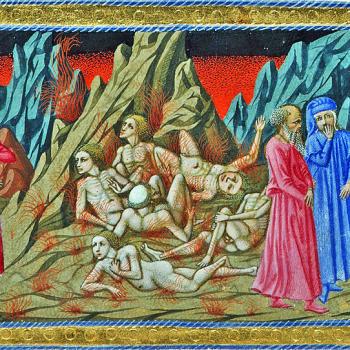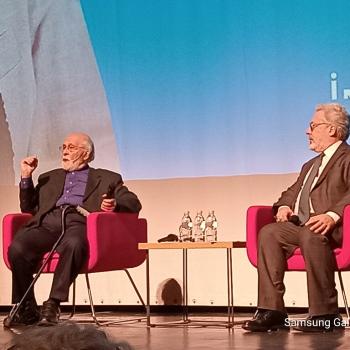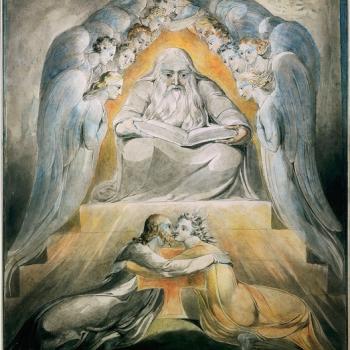
The phenomenon of evil raises many questions, especially in relation to how God can be justified if God allows such evil to happen. There have been and remain many ways to answer those concerns. However logical, however invaluable each potential solution might be, there always are more questions which can be raised. No one answer seems to be satisfactory. This is why it is invaluable for us to raise several different potential answers, with each giving a new angle, a complementary position, which helps us look at and examine the question in a new light. Each of them will provide is some element of the truth, and so prove worthy of our consideration, even if each of them always proves to be inconclusive in and of itself. Even though we recognize such answers are being complements to each other, when we examine them and try to bring them together, they seem to contradict each other in significant ways. This is because we are grasping for the absolute truth with limited intellects; what we have to deal with and accept is that our engagement with the truth will be filled with paradoxes, and in this regard, Kant was right in promoting the notion of antinomies. Nonetheless, even as we accept this, we will find some theodicies are more interesting, or more compelling, than others, and these tend to be the ones passed down from generation to generation. One such theodicy can be found in the felix culpa, the notion that our sin, our evil, is a “happy fault,” because in the end it has led to something greater than what would have been if there had been no such fault:
O certe necessárium Adæ peccátum,
quod Christi morte delétum est!O felix culpa,
quæ talem ac tantum méruit habére Redemptórem!O truly necessary sin of Adam,
destroyed completely by the Death of Christ!O happy fault
that earned for us so great, so glorious a Redeemer!
Tolkien embraced the felix culpa in his mythology. Despite all the harm which evil does, there is a sense that the freedom which has allowed such evil in the world allows for and will produce something greater than what could be if no such freedom existed. This is because evil cannot and will not have the final say. Instead, goodness will have the final word. Whatever has been harmed by evil will be taken in by the good, given what it needs to be healed, and will be rendered stronger and better than it was before. Tolkien worked with the notion that the harm that evil has done to the world (Arda) will be healed and in that healing, the world and all that is in it will be made greater than it was before:
There was, however, one element in the Design of Eru that remained a mystery: the Children of Eru, Elves and Men, the Incarnate. These were said to have been an addition made by Eru Himself after the Revelation to the primal spirits of the Great Design. They were not subject to the subcreative activities of the Valar, and one of the purposes of this addition was to provide the Valar with objects of love, as being in no way their own subject, but having a direct relationship to Eru Himself, like their own but different from it. There were, or were to be, thus “other” than the Valar, independent creations of His love, and so objects for their own reverence and true (entirely unselfregarding) love. Another purpose they had, which remained a mystery to the Valar, was to complete the Design by “healing” the hurts which it suffered, and so ultimately not to recover “Adar Unmarred” (that is the world as it would have been if Evil had never appeared), but the far greater thing “Arda Healed.” [1]
In Tolkien’s mythology, Eru, also known as Ilúvatar (God) created the Ainur (angelic beings), and together with them, produced a great work of music which established the guiding theme for creation, a theme which formed the basis for the history of the world (Arda). Some of the Ainur, like Melkor (also known as Morgoth), tried to take control, to disrupt the original harmony the Ainur produced and make it their own, only to find Eru was able to use that discord to create something new, a greater, more glorious harmony, which also helped share world history.
Then Ilúvatar spoke, and he said: ‘Mighty are the Ainur, and mightiest among them is Melkor; but that he may know, and all the Ainur, that I am Ilúvatar, those things that ye have sung, I will show them forth, that ye may see what ye have done. And thou, Melkor, shalt see that no theme may be played that hath not its uttermost source in me, nor can any alter the music in my despite. For he that attempteth this shall prove but mine instrument in the devising of things more wonderful, which he himself hath not imagined.’[2]
Despite the freedom which Eru gave to the Ainur, Eru was always working with, in and through them to establish elements of the music which only Eru gave to it, elements which demonstrated Eru remained in control of history. These elements were hidden to everyone but Eru until they manifested themselves in history, so that even the Ainur found themselves consistently surprised as to what they saw happening on Arda. Thus, though Eru had given the Ainur some power over history, they were not given ultimate control; there were many things in the world which went beyond their knowledge and understanding, among which were the “Children of Eru,” that is, the Elves and Men and other similar incarnates. While they were not as great as the Ainur, they had been given their own will, their own ability to shape the contours of history (beyond what the Ainur had done), and their histories would be filled with events which surprised the Ainur. This was, in part, because they came out of the harmony, the “third theme” which Eru made to deal with and overcome the harm that Melkor’s discord had brought to the world:
And they saw with amazement the coming of the Children of Ilúvatar, and the habitation that was prepared for them; and they perceived that they themselves in the labour of their music had been busy with the preparation of this dwelling, and yet knew not that it had any purpose beyond its own beauty. For the Children of Ilúvatar were conceived by him alone; and they came with the third theme, and were not in the theme which Ilúvatar propounded at the beginning, and none of the Ainur had part in their making. Therefore when they beheld them, the more did they love them, being things other than themselves, strange and free, wherein they saw the mind of Ilúvatar reflected anew, and learned yet a little more of his wisdom, which otherwise had been hidden even from the Ainur. [3]
The Children of Eru had their own destiny; included in it was their own ability to do evil, to bring further discord into the world, but in doing so, they were also capable of bringing everything together and establish a final and fitting conclusion to the world and its history, so that in and through them, Arda, the world could and would be healed. Obviously, Tolkien had the incarnation in mind as he wrote this, seeing that in and through humanity, God would become human and work in the world to heal it from all the damage sin had caused it. Nonetheless, this could be and would only be hinted with the most subtle of hints throughout Tolkien’s mythology; in his reflections on his mythology, such as we find in The Nature of Middle Earth, we find more of his own religious views and opinions, and how they are reflected upon in his myths, but in the myths themselves, he tried to keep such religious elements rare and obscure.
It would seem, in the way Tolkien saw humanity, and the rest of the Children of Eru, as taking part in the work of the Ainur by being a part of the harmony which is necessary to fix the discord Melkor brought to Eru’s design, Tolkien could also have been working with the classical theological opinion that humanity, in some fashion or another, had a destiny to replace those angelic beings which fell with Satan. That is, the “choir of angels” needed its full complement, and humanity could and would produce some who could serve that role. St. Anselm promoted this notion, though he thought (but was not sure) that humanity did more than merely replace the fallen angels:
If the angels, before any of them fell, existed in that full number about which we have spoken, then human beings were created solely for the purpose of replacing the angels who had neem brought to perdition, and it is plain that they will not be greater in number than these. If, on the other hand, the number of all the angels in existence did not add up to that perfect number, what needs to be supplied is both the number of those who had been brought to perdition and the number which had previously been lacking. Moreover, there will be more elect people than sinful angels, and thus we shall say that human beings were not created solely for the restoration of a number which had been depleted, but also to make up a number what was not yet complete.[4]
Tolkien, through his stories, engaged many of the theological problems which Christians engaged throughout the centuries, showing his basic agreement with the principles Christian thinkers have established, but doing so in a creative fashion. God established creatures with free will, creatures which could and would produce discord, but in the end, that discord would be and could be lifted up and used to make something better. Evil, though not approved by God, and not created by God, could still be used by God to produce something greater. Grace would heal the world from the effects of sin, and through that grace, not only would evil be overcome in the eschaton, what is good will made better thanks to the incarnation. This does not, of course, answer why things could not have developed without such disharmony. Perhaps the answer is that evil, no matter what it tries, has to be proven ineffective; that is, only if evil is defeated from within, instead by some external force making sure no one chooses evil, can it truly be overcome. If there were no freedom, no subjects which could will evil, evil would be a potential, and so long as it was a potential, it would not be properly overcome. It has to exhaust itself, and in that way, have its very potential extinguished from within. Thus, Tolkien suggested, only by allowing it to play it can it be undone and overcome, and in its overcoming, it will be shown that in all such evil, some good remains, a good which can and will be collected by God to establish a new, greater creation:
Then Ilúvatar spoke, and he said: ‘Mighty are the Ainur, and mightiest among them is Melkor; but that he may know, and all the Ainur, that I am Ilúvatar, those things that ye have sung, I will show them forth, that ye may see what ye have done. And thou, Melkor, shalt see that no theme may be played that hath not its uttermost source in me, nor can any alter the music in my despite. For he that attempteth this shall prove but mine instrument in the devising of things more wonderful, which he himself hath not imagined.’[5]
Evil must come to reveal its own inner weakness, its own inner contradiction, its own ineffectiveness, if it is to be overcome. Only by allowing creatures the freedom to do all they want to do, including all the evil they could want to do, will they see the full fruit of evil and in that demonstration, find its overcoming. The ultimate representation of this in Christian theology is the cross. For Jesus took up the cross as the loving servant of the world, allowing evil to do all it wanted to do to him. Jesus let evil use up all its energy and power on him, so that it could and would expire; in this way, evil was overcome from within. Jesus, in his death, and in the mysterious time before his resurrection, saw evil come to an end so that then he could take all the good which was left and take it into himself and establish a new, glorious creation, a new harmony out of the old, in and through his own resurrection. Thus, the glory of the resurrection is not just his own glory, but the glory of the new creation, the glory of the new harmony, which is begun in time but will find its fulfillment in eternity.
[1] J.R.R. Tolkien, “The Knowledge of the Valar,” in The Nature of Middle Earth. Ed. Carl F. Hostetter (Boston: Houghton Mifflin, 2021), 233.
[2] J.R.R. Tolkien, The Silmarillion. Ed. Christopher Tolkien (Boston: Houghton Mifflin, 1977), 17.
[3] J.R.R. Tolkien, The Silmarillion, 18.
[4] St. Anselm, “Why God Became Man” in Anselm of Canterbury. Major Works. Ed. Brian Davies and G.R. Evans (Oxford: Oxford University Press, 1998), 291-2.
[5] J.R.R. Tolkien, The Silmarillion, 17.
Stay in touch! Like A Little Bit of Nothing on Facebook.
If you liked what you read, please consider sharing it with your friends and family!













